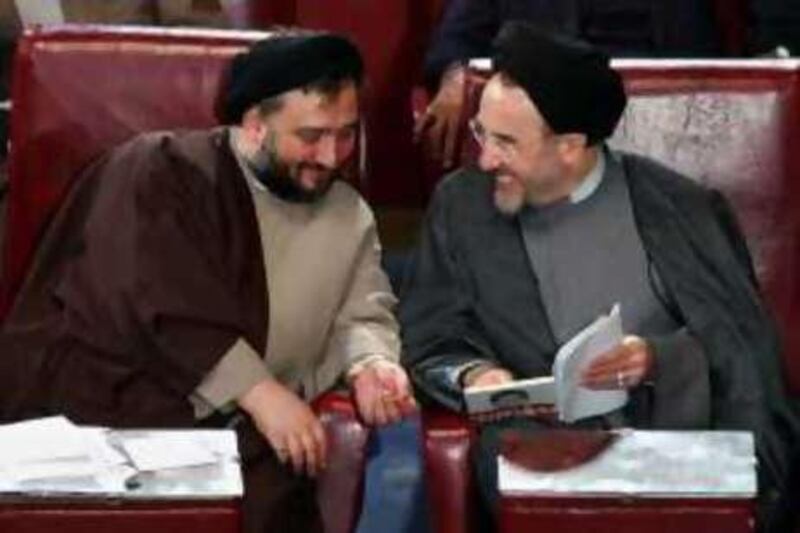NICOSIA // In person Mohammed Ali Abtahi comes across as genial, intelligent and mischievous as he does in his weblog, which he started five years ago, becoming the first Iranian politician to keep a cyber diary. With some 20,000 regular readers, his online musings became a huge hit and have been compiled in best-selling books. Mr Abtahi might seem an unlikely cyber star: he is a 50-year-old, mid-ranking cleric and former parliamentarian who served as vice president under Mohammed Khatami, Iran's reformist former president, operating as his chief of staff.
The two men, each heavyweight intellectuals with the common touch, remain close friends and share many interests. Mr Abtahi, who like Mr Khatami wears the black turban of a Sayyed - signifying they are descendants of the Prophet Mohammed - is president of the Institute for Interreligious Dialogue in Tehran. The subject is close to the heart of Mr Khatami, who has long championed a dialogue among civilisations.
It is that interest that brought Mr Abtahi to Cyprus, where he is one of hundreds of religious figures attending an interfaith conference organised by the Rome-based Community of Sant'Egidio, which is committed to building peace through dialogue between world religions. At a meeting in the Hilton Hotel in Nicosia, Islamic leaders are brushing shoulders with representatives of many other religions, including Christianity, Judaism and Buddhism.
Mr Abtahi said there is mounting pressure on Mr Khatami from Iranian reformers to contest presidential elections in June. The cajoling comes not only from reformist politicians who see Mr Khatami as the charismatic figurehead of their movement best placed to oust the incumbent, Mahmoud Ahmadinejad. There is also grassroots pressure from ordinary people. In one of his latest blog entries Mr Abtahi writes of a civil movement of web-savvy young people who are pressing Mr Khatami to enter the electoral race in the interests of Iran's "destiny".
Mr Khatami is known to be reluctant. During his two four-year terms as president between 1997 and 2005, a hardline minority, whose power lay beyond the ballot box, exploited its grip on key institutions to thwart his attempt to move from an authoritarian theocracy towards a modern Islamic democracy. Many of his supporters were upset that he never stood up to the hardline old guard more robustly; sympathisers said he never wanted to use the huge people power at his disposal in case it led to bloodshed.
Mr Abtahi appears confident Mr Khatami will eventually declare his candidacy out of a sense of historic duty, even if personally he does not want to enter what will be a bruising fray. Mr Abtahi argues that the time is opportune: people want someone to step forward to solve the "difficulties they are facing" because of Mr Ahmadinejad. Mr Abtahi does not spell out these "difficulties", which the media and the president's critics attribute mainly to his expansionary budget that has seen inflation soar to nearly 30 per cent. Unemployment is also rising.
In his blog, Mr Abtahi also describes Barack Obama's victory as a "global opportunity". It is clear he believes the change in the White House after "Bush's warlike policies" could pave the way to improved relations between Washington and Tehran. Mr Abtahi praised Mr Ahmadinejad for writing a congratulatory letter to Mr Obama, which was an unprecedented gesture by an Iranian president. But he added: "I don't think Ahmadinejad can solve the problems with the US" because maintaining the struggle against America remains a goal for some conservatives in Iran.
In other words, Mr Ahmadinejad would be resisted by influential forces within his own camp if he tried to engage with Washington. Does that mean Mr Khatami would be better placed to oversee a breakthrough in relations? "He hasn't been elected yet," Mr Abtahi said. However, Mr Abtahi wrote before the US elections that an Obama victory would be good for Iran's reformists while a Republican win would have suited Iran's conservatives.
"We have to put aside radical thinking and hardliners on both sides," said Mr Abtahi, referring to politicians in Tehran and Washington. His credo is spelt out in the "about me" section of his weblog. "The only way to save Iran would be to bring about reforms that would fully democratise Iranian society and that would respect norms and practices of our traditions and religion." The incremental gains made under Mr Khatami's tenure, which included significant cultural glasnost, were often lost on a young and restless populace. But Mr Abtahi believes Mr Khatami's eight years in power were "historic" because "democracy was institutionalised in Iran in those days".
Because of this, "people's demands have changed" and Mr Abtahi believes ordinary Iranians now would make it more difficult for Iran's old guard to resist change if Mr Khatami or another reformist wins June's presidential elections. There would still be strong opposition from conservatives. "But personally I think he [Khatami could] manage to deal with powers and pressure of opposition," Mr Abtahi said.
He is proud of what Iran's reformers achieved when they held executive power. It took the West hundreds of years to establish their democracies, he said. "We used to tell westerners 'we're trying to do in eight years what you did in 300'." Mr Abtahi used his blog (the English version is at http://www.webneveshteha.com/en/) to communicate openly with Iran's huge young population who were instrumental in sweeping Mr Khatami to his first landslide election victory in 1997 on a platform of liberalising Iranian society and politics.
Readers were delighted by some of Mr Abtahi's quirkier entries: he poked fun at his conservative rivals and posted photographs of Iranian and world leaders that he had snapped on his mobile phone camera. He once showed a prominent conservative journalist picking his nose. So popular was his blog that Mr Ahmadinejad later followed suit, although his web diary, available at ahmadinejad.ir in Persian, Arabic, English and French, is infrequently updated and lacks the vigour, spice and wit of Mr Abtahi's writing.
mtheodoulou@thenational.ae





